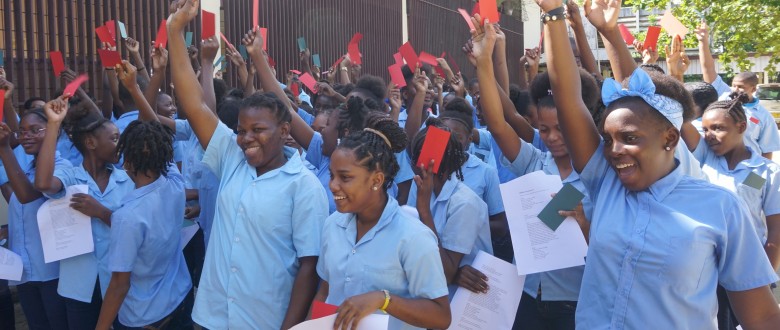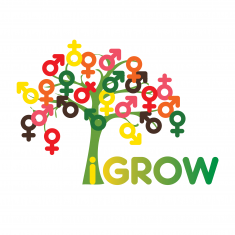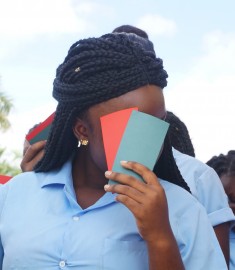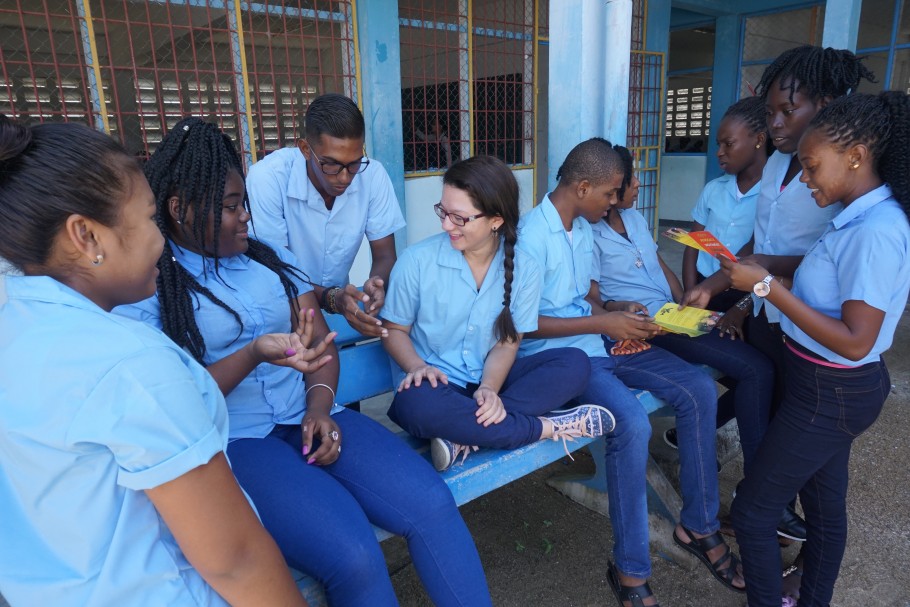
This blog was originally published on UNESCO's IIEP Learning Portal. It is the fourth in a series of contributions by VVOB. Read the previous ones on school leaders in Cambodia here, on teacher professional development in Vietnam here and on remedial teaching in Zambia here.
UNESCO’s latest technical guidelines on comprehensive sexuality education justly emphasise the role of gender sensitivity for quality comprehensive sexuality education. VVOB has been working on gender-related challenges in the vulnerable context of vocational schools in Suriname for some years. Since 2018, the training trajectories for teachers also include concrete tools to respond pedagogically to inappropriate sexual behaviour in schools, creating safe learning environments for all.
When behaviour becomes 'problematic'
Many adolescent students in Suriname’s lower secondary vocational education system (called ‘LBO’) come from vulnerable backgrounds. The country’s Ministry of Education, Science and Culture acknowledges this group is more prone to displaying ‘problematic’ behaviours in school, often sexual in nature. Hormones, peer pressure, stereotypical expectations … sexuality and gender are often the cause of how adolescent students behave, and why their behaviour can be regarded as problematic.
Because of this behaviour, and the energy it takes out of both teachers and students, the learning process of the whole class may suffer, as do students’ future chances at a decent job. This goes for both the student displaying the problematic behaviour as well as those who are victims of it. In the absence of a safe learning environment, perpetrators lack a space to express their confused adolescent feelings in a healthy way, while other students involved might be ‘on guard’ for and anxious about their peers instead of paying attention in class.
The Ministry has asked VVOB to work with their Centre for Professional Development (CENASU) to strengthen teachers and school leaders in LBO schools to prevent and manage these challenging behaviours.
Speaking up about sex: important but difficult
In a questionnaire organised by VVOB and the Institute of Graduate Studies and Research (IGSR), students from ten LBO schools shared that although they think it is important to be able to discuss their sexual feelings, teachers rarely discuss specific health issues such as HIV and gender-related behaviours with them.
Teachers affirm this barrier to talk about these issues candidly with their students, yet similarly recognise the value of doing so. They express the need for guidelines to enable these conversations and for tools to handle inappropriate sexual and gender-related behaviour in a straightforward manner.
To this end, in 2017-18, ten pilot schools received training in ‘Gender-sensitive prevention and management of challenging behaviour’ (GPAG) by trainers from CENASU, who were trained by VVOB beforehand. At the same time, students received comprehensive sexuality education through VVOB’s iGROW project, assisted by local CSO’s such as Stichting Lobi, Youth Empowerment Suriname and ProHealth.

IGSR questionnaire 2018: some results
- 10 LBO schools: eight in capital Paramaribo, two in Marowijne.
- 72% of the students say that teachers share general information about being and staying healthy, but much less so about specific issues such as HIV and gender-related behaviour.
- 61% of the students say that it is important to be able to talk about sexual feelings.
- 35% of the students indicate they can easily talk about sexual feelings with teachers.
- 63% of the teachers prefer people from outside the school to take care of sexual education.
How gender influences behaviour
During the GPAG learning trajectory, which consists of six training sessions and two coaching days, the full school team is taken on board to enrich their understanding and practical implementation of theories on challenging behaviours, the links between gender and behaviour, and inappropriate sexual behaviour.
For example, in the session ‘gender and behaviour’, participants are instructed to choose a present for the baby shower of an unborn baby, whose sex is unknown. This self-reflective exercise makes participants aware about how traditional gender roles and norms influence how we treat girls and boys. With a different exercise called ‘back in time’, participants reminisce about their own needs as a teenager to talk about sex and sexuality, which they can then contrast with their teaching practice.
These types of exercises incite a healthy conversation among participants with many personal accounts and experiences about gender, gender patterns and sexuality. Positive solutions are formulated for shared – albeit complex – issues. A common ground is reached that goes beyond individual upbringing, religions or cultures. It also creates a firm school team connection.
Straightforward Flag System as a pedagogical tool
Inspired by its track record of success in Belgium, VVOB and partners looked at expertise centre Sensoa to make the GPAG training even more relevant. Sensoa’s Flag System is an effective pedagogical instrument to manage inappropriate sexual behaviour, putting the adolescents’ learning processes at the heart throughout.
In a case of sexual behaviour, the Flag System offers an evidence-based approach for teachers and school leaders to react appropriately. Six criteria are taken into account:
- Mutual consent
- Voluntariness
- Equality
- Age or developmental phase
- Context
- Self-respect
After careful consideration of these criteria, a situation can raise a green (acceptable behaviour), yellow (moderately unacceptable behaviour), red (seriously unacceptable behaviour) or black (very seriously unacceptable behaviour) flag. Each flag points to a different appropriate response by the teacher or school leader, always putting the learning process of the involved student(s) at the heart.
This last point is imperative: the Flag System is a pedagogical tool to create safe environments in which students can express themselves, not a punitive tool.

Contextualisation and collaboration
In 2017, VVOB invited Sensoa to its offices in Paramaribo to see how the system could be adapted for Surinamese society. This was not an easy task. Not just because talking about sexuality in schools is still a taboo, but because it was not clear from the outset to what extent the different religions and cultures within the school teams and the Ministry contributed to this taboo.
VVOB put a lot of effort into getting as many stakeholders around the table, including government officials and school teams. We emphasised the importance of tackling the issue together and advised on how to facilitate collaboration with schools that could be hesitant towards change in this respect, such as faith-based schools.
The Flag System has now been adopted by ten pilot LBO schools after an intensive training trajectory of their school teams. VVOB, the Ministry and CENASU look back proudly on the training of this first group. The partners were pleasantly surprised about how openly the school teams talked about the difficult topics of gender and inappropriate sexual behaviour. The school teams were equally happy with how the Flag System creates safe spaces for students involved in inappropriate behaviour – both the perpetrators and victims.
End 2018, CENASU started rolling out the updated training in ‘Gender-sensitive prevention and management of challenging behaviour’ to an additional 23 LBO schools, after which the remaining LBO schools in the country will be tackled.
What teachers think of Sensoa’s Flag System:
"The system makes you rethink everything"
"I love the Flag System. I don’t just use it in schools, but also with my nieces and nephews"
"I’ve gotten a better grasp of the issues thanks to the system, and my colleagues and I now approach challenging behaviour in a similar way. There was a huge gap between my culture and the school where I teach. I was brought up very differently, but thanks to this training, our learners now have a better chance with education"





